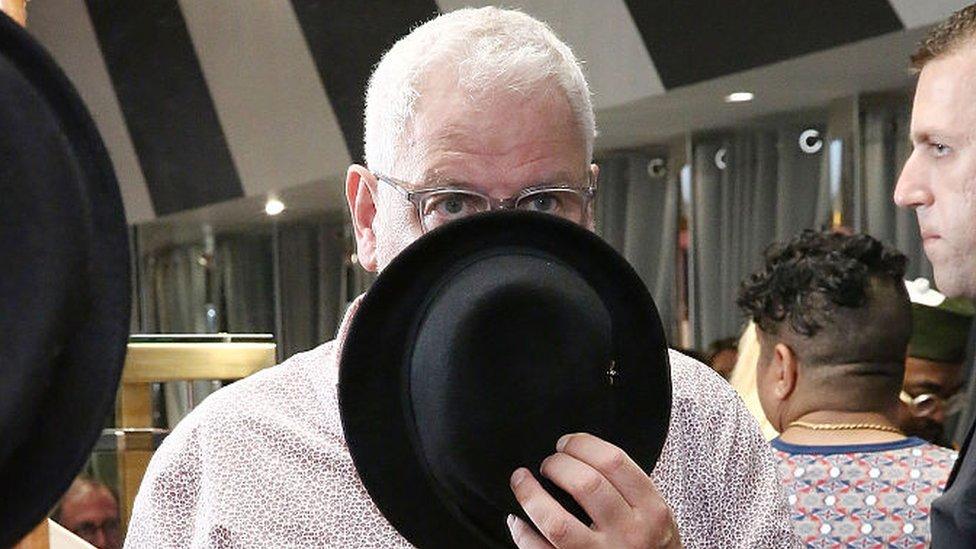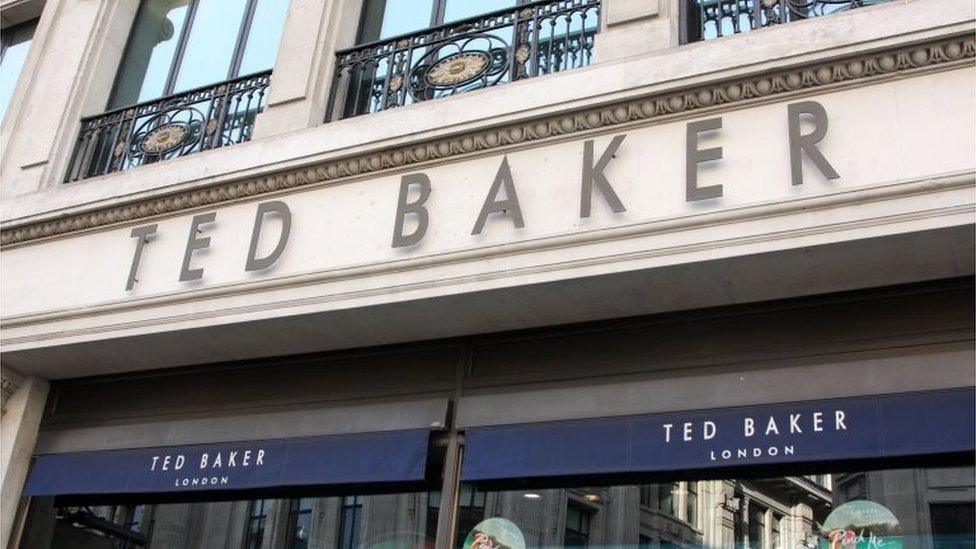Can you say no to a hug from your boss?
- Published

Is it ever ok to hug at work, or is it just best to stick to a polite handshake? And what are your rights to refuse if you're really not into the idea of hugging colleagues?
What happens if your boss wants to hug you, cuddle you, massage you, or even to kiss your neck?
A number of staff at fashion firm Ted Baker have signed a petition complaining about the company's founder and chief executive Ray Kelvin, accusing the 62-year-old of forcing workers to hug him.
The company has begun an investigation into allegations of verbal, physical and sexual harassment.
One Ted Baker employee who wanted to remain anonymous told the BBC's Today programme: "He had a policy of hugging everyone, rather than a handshake.
"Nothing wrong with that, but these hugs were extremely physically imposing, as well as awkwardly long, often conducted very publicly in front of the whole office.
"There was nothing inherently wrong with the actual hugs, but the uncomfortableness came from what tended to accompany them. Unwanted personal comments, kisses on the cheek, neck-stroking all used to happen after [the hugs] - particularly with women.
"My 'welcome' hug was in a relatively private environment of a meeting, but even so, I felt massively uncomfortable."
The employee's most uncomfortable moment was a "deeply embarrassing" shoulder massage Mr Kelvin gave in front of visitors.
Another Ted Baker staff member said they witnessed Mr Kelvin giving other employees long hugs, kissing necks and massaging people's ears.
"This would happen every day if he was in a good mood," the employee said.
The company said it was "critically important to us that every member of our staff feels valued and respected at work".
"Ray greets many people he meets with a hug, be it a shareholder, investor, supplier, partner, customer or colleague. Hugs have become part of Ted Baker's culture, but are absolutely not insisted upon."

Ted Baker boss Ray Kelvin declines to show his full face in pictures
So what are your rights at work regarding hugs?
James Watkins, an employment lawyer at Slater and Gordon, says that not all physical contact is inappropriate, and there's nothing to stop consenting adults hugging in the workplace.
"But would-be huggers should be mindful that not everyone will welcome a hug and the context will often not be suited to one," he says.
If you get hugged, and you just don't like it, then tell the other person.
"It takes courage to tell someone you work with that you find their hugs uncomfortable, but it will often be the quickest and easiest way to get them to stop," he says.
If this is a continuing problem, you can speak to a colleague in confidence, human resources, or your boss.
Crossing the line
If the problem can't be resolved informally, you have the right to make a written complaint, known as a grievance, about any problems you have at work, including problem hugging. Your employer then has a duty to investigate that complaint.
But what happens if the hugger is your boss?
That is less likely to be appropriate, says Mr Watkins, because "the balance of power favours the more senior person".
"It would be entirely understandable for an employee to feel awkward or even intimidated if their boss goes in for a hug," he says.
"A massage or a kiss on the neck are more intimate acts that would almost never be appropriate at work, unless you're in a relationship with the other person and this happens in a private space."
What happens if you think your colleague or boss has crossed the line into sexual harassment?
"It all depends on the situation, which could include many factors like the duration of the hug, the positioning of the hands and body, and the extent to which the other person invades your personal space," Mr Watkins says.
"The law states that if treatment of a sexual nature is unwanted and creates an intimidating, hostile, offensive or degrading environment for the employee, this amounts to sexual harassment.
"If this happens, the individual concerned may wish to raise a grievance and to complain to an employment tribunal," he adds.
Always dignity
Crucially, whether behaviour is harassment or not depends on the perception of the person making the complaint, not the hugger, says Philip Landau of specialist employment law firm Landau Law Solicitors.
But it also depends on whether a reasonable person would find the questionable behaviour offensive, he says. An employee could be "being oversensitive", he says.
If you think there's a problem, it is a good idea to keep diary entries of what has been going on, including times, dates and location, he says.
Touching someone becomes sexual harassment when it "violates your dignity or creates a hostile working environment", Mr Landau adds.
"It does not matter if the touching was not intended as sexual harassment, as long as you feel harassed and it is reasonable for you to do so," he says.
- Published3 December 2018

- Published2 December 2018
